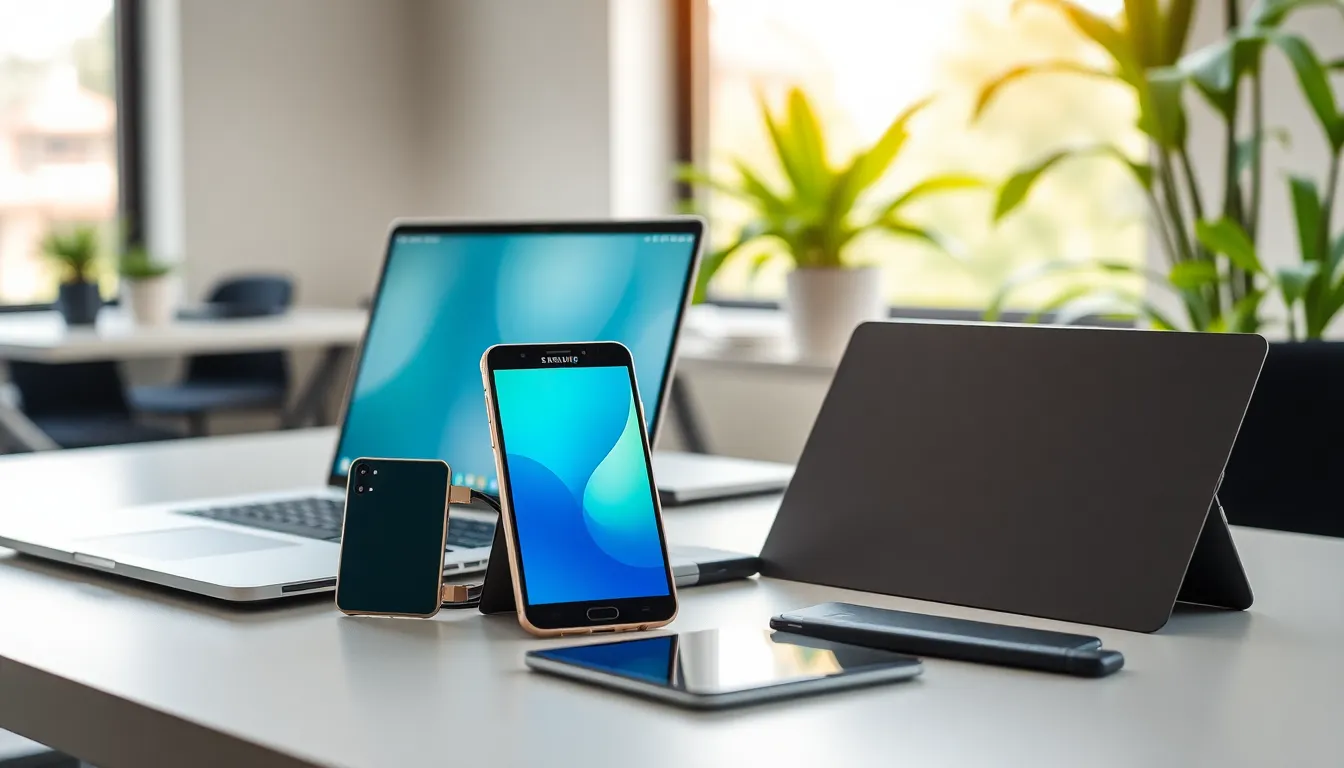In a world where tech brands pop up faster than you can say “smartphone,” navigating the sea of options can feel like finding a needle in a digital haystack. From sleek laptops to quirky gadgets, each brand promises to revolutionize your life, but which ones actually deliver?
Table of Contents
ToggleOverview of Tech Brands
Tech brands dominate the market, offering a variety of electronic products and services. Leading companies continuously strive to differentiate themselves through innovation and user experience. Consumers encounter names like Apple, Samsung, and Microsoft, all recognized for their impactful contributions to technology.
Apple focuses on seamless integration across devices, emphasizing aesthetic design and user-friendly interfaces. Samsung remains a leader in display technology, offering high-quality screens in smartphones and televisions. Microsoft excels in software solutions and cloud services, catering to businesses and individual users alike.
Emerging tech brands often introduce disruptive technologies, offering unique alternatives to established products. Companies such as OnePlus and Xiaomi provide competitive pricing while maintaining quality, appealing especially to budget-conscious consumers. Their strategies challenge traditional giants, prompting industry innovation.
Additionally, sustainability has become a focal point for many tech brands. Companies now prioritize eco-friendly practices and products, responding to consumer demand for responsible manufacturing. Brands like Dell and HP showcase initiatives to reduce electronic waste and promote recycling.
In assessing tech brands, factors such as product reliability and customer support significantly influence buyer decisions. The rapidly changing landscape means that consumer loyalty can shift with new product releases and advancements in technology. Awareness of brand reputations and reviews plays a crucial role in consumer choices.
Navigating this complex market requires consumers to stay informed about trends and brand promises. Understanding which brands invest in user satisfaction and ethical practices can guide purchasing decisions, ensuring that investments align with expectations.
Popular Tech Brands in 2023

Several tech brands stand out in 2023, each bringing unique features and innovations to the consumer market.
Brand A: Features and Review
Apple consistently leads in delivering seamless ecosystem integration. Its flagship products, including the iPhone and MacBook, boast user-friendly interfaces, powerful hardware, and strong security. Customers appreciate regular software updates and a broad range of applications. Notable for maintaining high resale value, Apple products cater to users who prioritize quality and reliability. The brand continues to innovate with features like advanced camera technology and energy-efficient processors.
Brand B: Features and Review
Samsung excels with its diverse product lineup, featuring impressive display technology. Its Galaxy series smartphone stands out for vibrant screens and versatile camera setups. Users often highlight innovations in battery management and rapid charging capabilities. The company invests heavily in R&D, allowing it to remain competitive in the fast-paced tech landscape. Additionally, Samsung’s commitment to sustainability through eco-friendly production methods appeals to environmentally conscious consumers.
Brand C: Features and Review
Microsoft primarily focuses on software solutions and cloud services through platforms like Windows and Azure. This brand is synonymous with productivity in both personal and business environments. Users rely on Microsoft Office applications for efficient workflow management. Azure supports organizations in building and deploying applications with ease. Regular updates and support enhance the user experience, solidifying Microsoft’s reputation in enterprise technology and providing a robust alternative to traditional operating systems.
Comparison of Tech Brands
Tech brands vary significantly across several dimensions, impacting consumer choice. Key factors include performance, design, and price.
Performance
Performance remains a vital consideration when evaluating tech brands. Apple products like the iPhone and MacBook deliver high processing power and reliability, suitable for demanding tasks. Samsung’s Galaxy smartphones feature advanced processors, ensuring smooth multitasking and gaming experiences. Microsoft focuses on performance through its Windows OS, providing stability and efficiency for software applications. Emerging brands like OnePlus and Xiaomi offer impressive performance at competitive prices, appealing to budget-conscious consumers. Ultimately, each brand’s commitment to innovative technology plays a crucial role in user satisfaction.
Design
Design influences brand perception and user experience significantly. Apple prioritizes sleek, minimalist aesthetics that resonate with consumers, evident in their products’ premium finishes. Samsung emphasizes vibrant displays, particularly visible in the Galaxy series, attracting users who value visual quality. Microsoft balances functionality and design, especially in its Surface line, which combines portability with elegance. Emerging brands like OnePlus prioritize user-friendly interfaces while maintaining a modern look. The design philosophy of each brand often reflects its target audience, enhancing appeal.
Price
Price serves as a crucial factor in tech brand comparison. Apple products generally come at a premium, reflecting their brand status and quality. Samsung offers a wider range, from budget-friendly models to high-end devices, catering to various market segments. Microsoft provides competitive pricing on software and devices, ensuring accessibility for businesses and individuals. OnePlus and Xiaomi disrupt the market with lower-priced alternatives, offering high-quality features without the hefty price tag. Consumer choice often hinges on balancing quality and affordability, making price a deciding aspect.
User Experiences and Feedback
Consumer experiences with tech brands reveal varied perspectives and insights. Apple users often praise the seamless integration between devices and the reliability of flagship products. They highlight iPhones and MacBooks for their robust performance and user-friendly interfaces.
Samsung receives positive feedback, particularly about the Galaxy series smartphones. Customers note the impressive display quality and long-lasting battery life. They appreciate the company’s commitment to sustainability, showcasing eco-friendly production methods.
Microsoft garners respect for its software offerings. Many users find Windows and Azure indispensable for enhancing productivity in personal and professional settings. Positive remarks often focus on performance and user support.
Emerging brands like OnePlus and Xiaomi attract attention for their innovative products at competitive prices. Users commonly express satisfaction regarding the balance between quality and affordability. This aspect has allowed them to stand out in a saturated market.
Reliability plays a vital role in consumer decision-making. Customers frequently emphasize the importance of consistent performance and strong customer support when choosing a tech brand. Consumers often research brand reputations to ensure they make informed choices.
Customer loyalty remains a crucial factor. Many users tend to stick with brands that have met their expectations in terms of performance and value. Brand reputation can significantly influence future purchasing decisions as consumers navigate the technology landscape.
Feedback underscores the growing demand for eco-friendly practices. More consumers prioritize brands that implement sustainable initiatives, prompting established and emerging companies to adapt their practices. This growing trend reflects a larger movement towards responsible consumption in technology.
Navigating the tech landscape can be daunting with so many brands vying for attention. Consumers must weigh performance design and price while also considering sustainability and customer support. Established names like Apple Samsung and Microsoft continue to set high standards but emerging brands like OnePlus and Xiaomi are proving that innovation doesn’t always come at a premium.
As technology evolves rapidly staying informed about brand reputations and trends is crucial. By understanding the unique strengths and weaknesses of each brand consumers can make better decisions that suit their needs. Ultimately the right choice hinges on a balance of quality affordability and personal preference in this ever-changing market.

